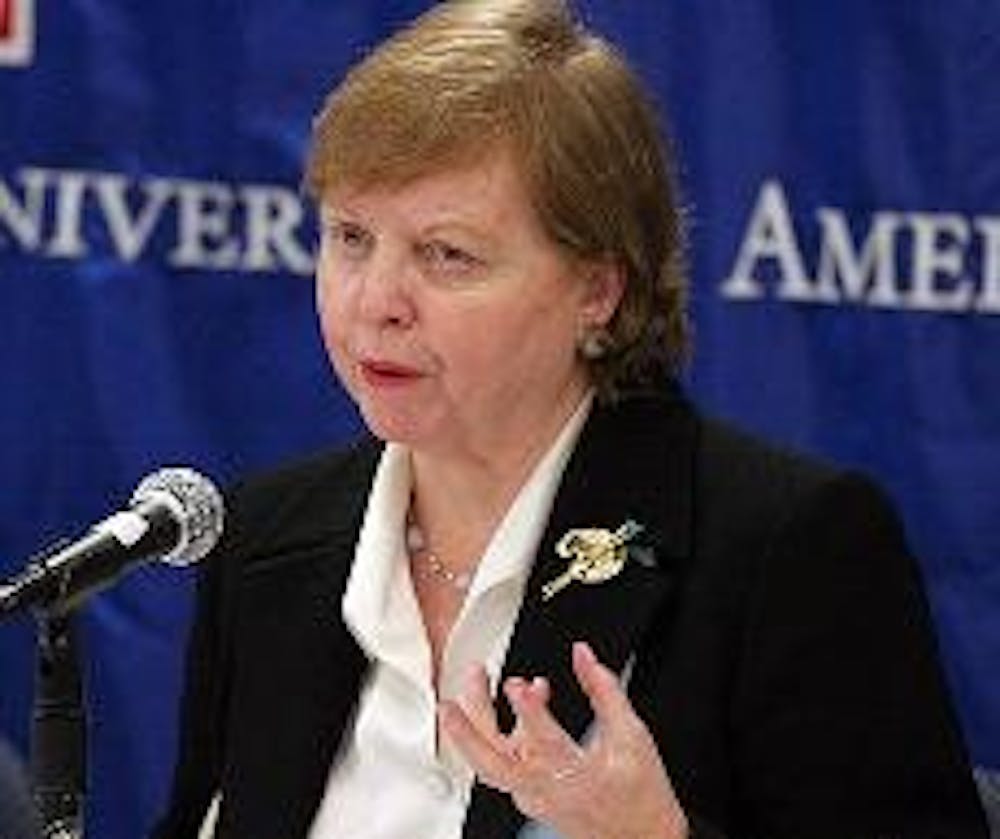While Tuesday's presidential primaries produced a clear front-runner for the Republican Party, they left the choice in the Democratic race more muddled, said Dotty Lynch, executive-in-residence in the School of Communication and political consultant for CBS News, during a panel discussion Wednesday.
Sen. John McCain took more than 500 delegates in Tuesday's primaries, making it difficult for his challengers to catch up, said Republican pollster Glen Bolger.
"It's very difficult to envision a catch-up effort by [former Massachusetts Gov. Mitt] Romney," Bolger said.
Both leading Democratic candidates succeeded in their strategies. Illinois Sen. Barack Obama won the smaller states all over the country, and New York Sen. Hillary Clinton won the states with the most delegates, according to Candice Nelson, a professor in the School of Public Affairs.
Although Clinton has won more delegates with her strategy, it may be difficult for her campaign to sustain interest in the next few weeks as primaries turn to smaller states Obama expects to win, Nelson said.
Exit polls from Tuesday's primaries offered a lot of information about which demographics are voting for whom and what issues they care about, said AU President Neil Kerwin.
"It's extraordinary that this much data can be consumed and analyzed in less than 24 hours," Kerwin said.
Poll results are important to journalists because they provide data to support claims and show trends in what people care about, Lynch said.
Tuesday may have been the big day for candidates, but yesterday was "Super Wednesday" for the media, Lynch said.
"Campaigns are spinning us like crazy," she said.
On Tuesday, the media were more cautious than usual about declaring election results after they were misled by polling expectations in the New Hampshire primary, Lynch said.
Lynch said she cautioned people to take generalizations with a grain of salt. Both Clinton and Obama get good chunks of each other's constituents, she said, pointing out that differences between women's and blacks' votes differ by a 60-to-40 split at best.
For campaigns, polls are planning tools, not predictors, Bolger said.
"The reason you run a campaign is to change things," he said.
It is difficult to determine what effect celebrity endorsements have on election results since most people will not admit to their influence in polls, Lynch said.
Endorsements help create press and awareness about a campaign, according to Bolger.
"Endorsements are door openers, not deal sealers," he said.
Massachusetts Sen. Edward Kennedy's endorsement of Obama at AU didn't have a direct impact on his campaign - Obama lost Massachusetts, where Kennedy's endorsement was predicted to help. However, it did generate a lot of press for both Obama and AU, said James Thurber, director of the university's Center for Congressional and Presidential Studies.
While AU is not endorsing a specific candidate, the turnout for Obama's campaign rally showed that the AU community is an important center for politics, Kerwin said.
"I am violently partisan for American University," Kerwin said.
Rachel Mlinarchik, a staff member at AU, said it was interesting to hear how all the groups break down in the polls.
Older people, women and Latinos are more likely to vote for Clinton while young people and blacks are more likely to vote for Obama, according to the panelists. Good questions from students helped fuel the discussion, Mlinarchik said. The Center for Congressional and Presidential Studies sponsored the panel.
Democratic primaries
Feb. 9 Louisiana, Nebraska, Virgin Islands, Washington Feb. 10 Maine Feb. 12 District of Columbia, Maryland, Virginia Feb. 19 Hawaii, Wisconsin Mar. 4 Ohio, Rhode Island, Texas, Vermont Mar. 8 Wyoming Mar. 11 Mississippi April 22 Pennsylvania May 3 Guam May 6 Indiana, North Carolina May 13 West Virginia May 20 Kentucky, Oregon June 1 Puerto Rico June 3 Montana, South Dakota
Republican primaries
Feb. 9 Guam, Kansas, Louisiana Feb. 12 District of Columbia, Maryland, Virginia Feb. 19 Washington, Wisconsin Feb. 23 American Samoa, Virgin Islands Feb. 24 Puerto Rico Mar. 4 Ohio, Rhode Island, Texas, Vermont Mar. 11 Mississippi April 22 Pennsylvania May 6 Indiana, North Carolina May 13 Nebraska May 20 Kentucky, Oregon May 27 Idaho June 3 New Mexico, South Dakota
SOURCE: Project Vote Smart





